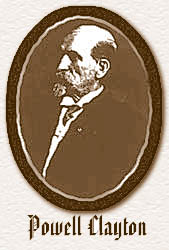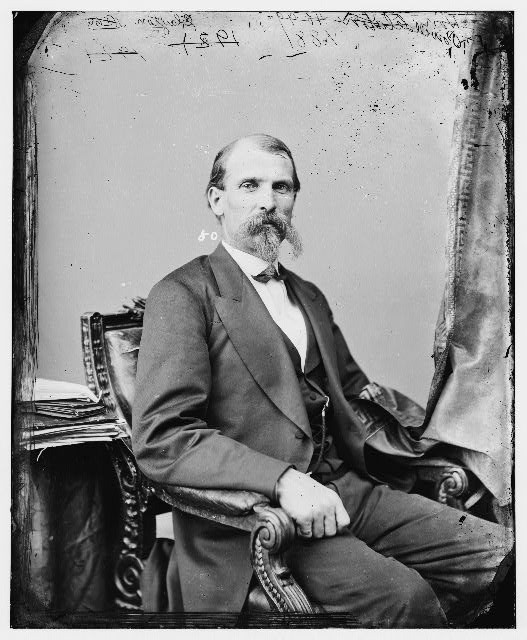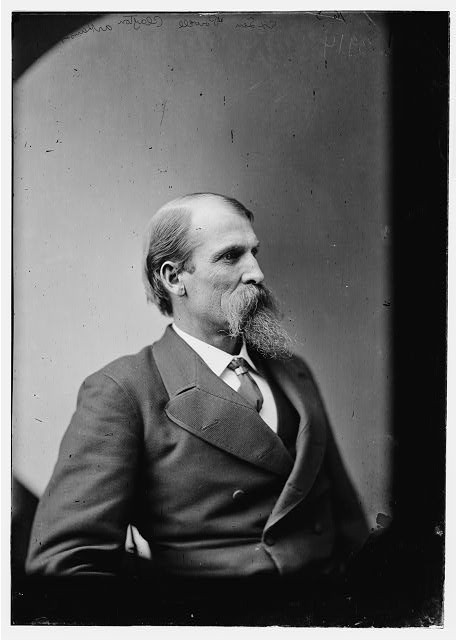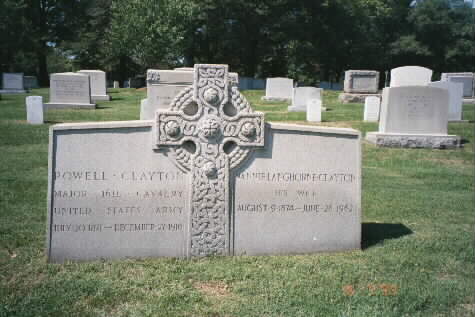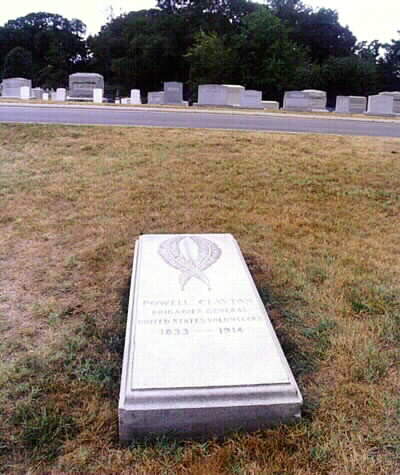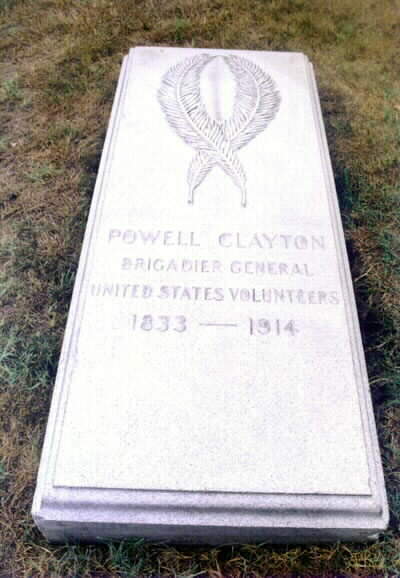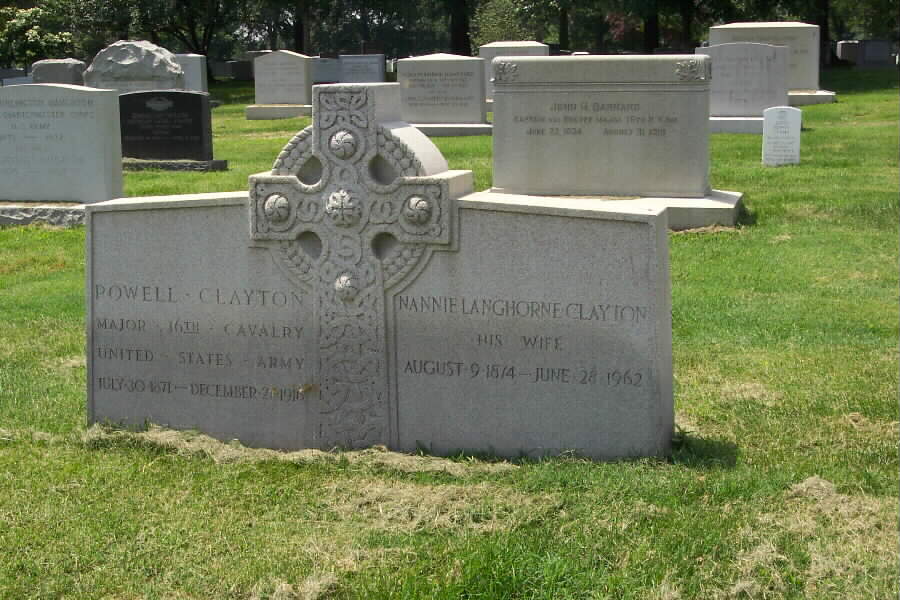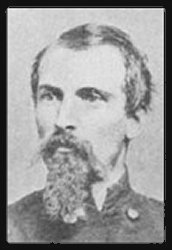
In December 1861, be became Lieutenant Colonel of the 5th Kansas Cavalry and in March 1862, its Colonel. He was made a Brigadier General, U.S. Volunteers, August 1, 1864. In the interval, and thereafter until mustered out, he served primarily in Missouri and Arkansas. Fought at Wilson’s Creek and after capture of Little Rock in September 1863, was assigned to command post at Pine Bluff, where in October he repulsed an attack by Confederate General J. S. Marmaduke. Soon after the war he bought a plantation and engaged in cotton farming.
In 1868 he was elected the first carpetbagging governor of Arkansas, “neither the worse nor the best of the gentry”, according to one of his biographers; he remained the Republican boss of Arkansas from then until death. He was defeated for reelection in 1876 by the reenfranchised conservatives, and returned to Arkansas and in 1882 established residence at Eureka Springs, where he managed hotels and railroads.
From 1897 until 1905 was ambassador to Mexico in Administration of Presidents William McKinley and Theodore Roosevelt. In about 1912, he moved to Washington, DC, where he died August 25, 1914. He was buried in Section 3, Grave 2035-WS, Arlington National Cemetery.
CLAYTON, POWELL
BRIG GEN US VOLS
- VETERAN SERVICE DATES: Unknown
- DATE OF DEATH: 08/25/1914
- DATE OF INTERMENT: Unknown
- BURIED AT: SECTION SD/WE SITE LOT 2035
- ARLINGTON NATIONAL CEMETERY
In the same site are buried:
Powell Clayton, Major, US Army. 16th U.S. Cavalry. July 30, 1871-December 27, 1916. Adjacent to Bertram Tracy Clayton. Clayton, Powell, Jr., Arkansas. Second Lieutenant, 5th United States Cavalry, 13 January 1892, First Lieutenant, 16 October 1898, Captain, 11th United States Cavalry, 2 February 1901
Nannie Langhorne Clayton, wife of Major Clayton Powell. August 9, 1874-June 28, 1962.
CLAYTON, NANNIE TAYLOE LANGHORNE W/O POWELL JR
- DATE OF BIRTH: 08/09/1874
- DATE OF DEATH: 06/28/1962
- DATE OF INTERMENT: 07/02/1962
- BURIED AT: SECTION 3 SITE 2200 E S
- ARLINGTON NATIONAL CEMETERY
- WIFE OF PPOWELL CLAYTON, JR – CAPT 1TH US CAV USA
CLAYTON, POWELL JR
MAJOR 16TH US CAV
- VETERAN SERVICE DATES: Unknown
- DATE OF DEATH: 12/27/1916
- DATE OF INTERMENT: Unknown
- BURIED AT: SECTION 3 SITE LOT 2200
- ARLINGTON NATIONAL CEMETERY
Benjamin Franklin Clayton, Captain, US Army. Company F, 102nd New York Infantry. June 18, 1833-October 5, 1909.
Anna Rebecca Nichols Clayton, Wife of Benjamin Franklin Clayton. March 31, 1842-July 24, 1918.
Bertram Tracy Clayton, Colonel, United States Army, and Member of Congress, who was killed in action in World War I.
Richard Bard Clayton, Major, US Army. 1867-1938.
Grace Thompson Clayton, Wife of Richard Bard Clayton. 1876-1963.
Courtesy of the Congress of the United States:
Senator from Arkansas; born in Bethel, Delaware County, Pa., August 7, 1833; attended the common schools and Partridge Military Academy, Bristol, Pa.; studied civil engineering in Wilmington, Del.; moved to Leavenworth, Kans., where he practiced his profession; appointed city engineer in 1857; at the outbreak of the Civil War entered the Union Army and served until 1865, attaining the rank of brigadier general; moved to Arkansas and became a planter; elected Governor of Arkansas in 1868; elected as a Republican to the United States Senate and served from March 4, 1871, to March 3, 1877; chairman, Committee on Enrolled Bills (Forty-third Congress), Committee on Civil Service Retrenchment (Forty-fourth Congress); moved to Little Rock, Ark.; member of the Republican National Committee; ambassador to Mexico 1897-1905; lived in retirement until his death in Washington, D.C., on August 25, 1914; interment in Arlington National Cemetery, Fort Myer, Va.
Powell Clayton
9th Governor of Arkansas, 1868-1871
One of the most influential figures in the early development of Eureka Springs, Arkansas was Brigadier General Powell Clayton of the Union Army, ninth governor of Arkansas, and the first governor of the state during the reconstruction period following the Civil War.
Clayton was born on August 7, 1833 in Bethel County, Pennsylvania to a family with deep roots in politics and public service. He attended Partridge Military Academy, and studied civil engineering at Wilmington, Delaware.
At the outbreak of the Civil War, Clayton joined the Union Army; he first arrived in
Arkansas in 1863 to participate in the Union occupation of Little Rock. Though Clayton’s original party affiliation was Democratic, after Congress declared the government of Arkansas and other confederate states illegal in 1867, Clayton participated in the formation of the state’s first Republican party. He was nominated as the Republican gubernatorial candidate in 1868.
Clayton campaigned on the platform of “doctrines of loyalty, freedom, Negro rights, economic development, and free public education for both races alike,” in a violent and vitriolic political race. Following his election to Governor and the unanimous ratification of the 14th Amendment by the Arkansas legislature, the state was declared “reconstructed” and Arkansas was re-admitted to representation in Congress.
Clayton’s three-year term as Governor was a time of marked turmoil. He declared martial law and organized a state militia to fight the activities of the recently formed Ku Klux Klan; the Klan disbanded in Arkansas two months after Clayton revoked martial law. Clayton was known as a politician who “knew the value of patronage in maintaining political control of the state and personal control of the Republican party.” Though Clayton endured numerous character attacks and charges of criminal conduct, his political enemies were never able to provide sufficient evidence for conviction.
In 1873, Clayton assumed the presidency of the Little Rock, Mississippi River and Texas Railroad Company. It was the role of railroad entrepreneur that brought Clayton, his wife Adaline, and their children to Eureka Springs in 1881, where he built a luxurious home in Eureka’s “Silk Stocking District.” The original Clayton residence is the present-day location of the Crescent Cottage Inn.
As president of the Eureka Springs Improvement Company (ESIC), Clayton worked to bring the railroad to Eureka Springs, a pivotal event in Eureka’s development as one of the premier healing resorts of the Victorian Era. The ESIC also built one of Eureka’s most famous landmarks, the Crescent Hotel, and the poem which is written on the fireplace in the Crescent Hotel lobby is attributed to Governor Clayton:
“Although, upon a summer’s day,
You’ll lightly turn from me away;
When autumn leaves are scattered wide,
You’ll often linger by my side;
But when the snow the earth doth cover,
Then you’ll be my ardent lover.”
Clayton ended his political career as the United States ambassador to Mexico. He died in Washington, DC on August 25, 1914, and is buried at Arlington National Cemetery.
Powell Clayton, a native Pennsylvanian elected governor of Arkansas in 1868. Though a carpetbagger, he had quite a connection to his new state; as a cavalry
commander, he won a series of stunning Union victories there, losing his right arm in the process. Liking what he saw, Clayton stayed after the war to try his hand at cotton planting and was lured into politics by admiring neighbors.
During his tenure as governor, Clayton oversaw a period of impressive financial growth and population increase, advocating education and railroad construction, and battling the Ku Klux Klan. Pushed out by fellow Republicans, he left office in 1871 but soon after won a seat in the Senate, where he served for six years, and later became ambassador to Mexico.
Clayton did not address the stigma of the interloper until his final years, when he spent much of his time composing a comprehensive defense of his term as governor against revisionist attacks on all carpetbagger politicians. In The aftermath of the Civil War in Arkansas, Clayton demonstrated that the majority of his state’s carpetbaggers came south not for personal gain but because of a genuine affection for their new homes.
“With a very few exceptions,” he wrote, “the Northern men who settled in Arkansas came there with the federal Army and … were so much impressed with its genial climate and great natural resources as to cause them … to make it their future home.”
POWELL CLAYTON DIES IN 82ND YEAR
Distinguished Statesman, Diplomat and Soldier Passed Away In Washington
Fine Civil War Record
Rose To Brigadier General – Mexican Envoy for Eight Years
Governor and Senator
WASHINGTON, August 25, 1914 – General Powell Clayton, distinguished statesman, diplomat, and soldier, died at his apartment here tonight at the age of eighty-one years. He had been in feeble health for many months.
A native of Bethel, Pennsylvania, and educated as a civil engineer, General Clayton immigrated to Kansas in 1861 and there entered the Union Army. He rose to the rank of Brigadier General.
After the war he went to Arkansas, and in 1868 was elected Governor of the State. Three years later he was sent to the United States Senate. The General was appointed Ambassador to Mexico by President McKinley in 1897 and held that post until 1905 when he retired from public life. For forty years he was a member of the Republic National Committee and attended every meeting.
Private funeral services will be held here and the body will be buried at Arlington Cemetery with military honors.
General Clayton married Adaline McGraw of Helena, Arkansas, in 1865.
Michael Robert Patterson was born in Arlington and is the son of a former officer of the US Army. So it was no wonder that sooner or later his interests drew him to American history and especially to American military history. Many of his articles can be found on renowned portals like the New York Times, Washingtonpost or Wikipedia.
Reviewed by: Michael Howard

